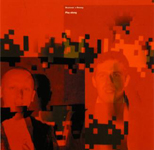|
|
 |
Dusted Reviews
Artist: Scanner + Dessy Album: Play Along Label: Sub Rosa Review date: Aug. 3, 2005 |

|
|
|
 |
Stockhausen’s Kontakte did it famously in 1960, and numerous others have done it since, so the juxtaposition of acoustic and electronic sound sources in modern composition isn’t a shocking occurrence to audiences in 2005. But Belgian composer Jean-Paul Dessy and Robin Rimbaud, the man otherwise known as Scanner, manage to find some interesting angles. Play Along doesn’t mark a climactic event in the meeting of electronic and acoustic sound, but Rimbaud and Dessy’s approach makes for an interesting reconstitution of their usual forms and techniques.
The opening title track is clearly the intended showpiece here. Over the nearly half-hour composition, the two integrate each other’s material – Rimbaud creates samples of Dessy’s strings, while Scanner’s trademark electronic timbres serve as inspiration for Dessy’s composition, performed by the Ensemble Musique Nouvelles. However, “Play Along” doesn’t always reflect the excitement of inception, and, despite all that went into its creation, it’s the album’s least provocative piece. The strings concentrate on short periods of strumming, often gliding up or down the scale gracefully, in between bits of more frenzied activity. Rimbaud acts as rhythmic referee throughout the piece, lending little more than click-clack beats and subtle pulses. He accompanies the strings well, but his efforts feel a little too comfortable. “Play Along” would benefit from some more of Rimbaud’s less regimented flourishes.
Scanner’s solo piece, “Out of the Trench and Wading Backwards,” is built from sampled snippets of Rimbaud’s improvisations. Like much of Matmos’ more recent work, however, the overall music is only as interesting as the composition, with the uniqueness of the sound sources mattering little if the piece is constructed in too mundane a manner. Luckily, Rimbaud is more expansive here than in the collaboration, and rhythms fall prey to heavier drones and smaller momentary gestures.
It’s not entirely clear how Jean-Paul Dessy created “Whaling Wolves,” and that’s partially why it seems the disc’s most adventurous piece. He used a prior composition as a blueprint, then removed all the acoustic instrumentation, leaving the piece in vaporous shadows. It’s an aural ghost town, a nearly deserted space in which all traces of life and activity have vanished. Dessy’s nomenclature of the piece is appropriate, given that much of “Whaling Wolves” could be a compilation of warped canine howls. With this technique, Dessy has truly removed himself from his compositional comfort zone, and, in doing so, struck closest to the basic intention of Sub Rosa’s new Electro-Contempo series.
By Adam Strohm
|







